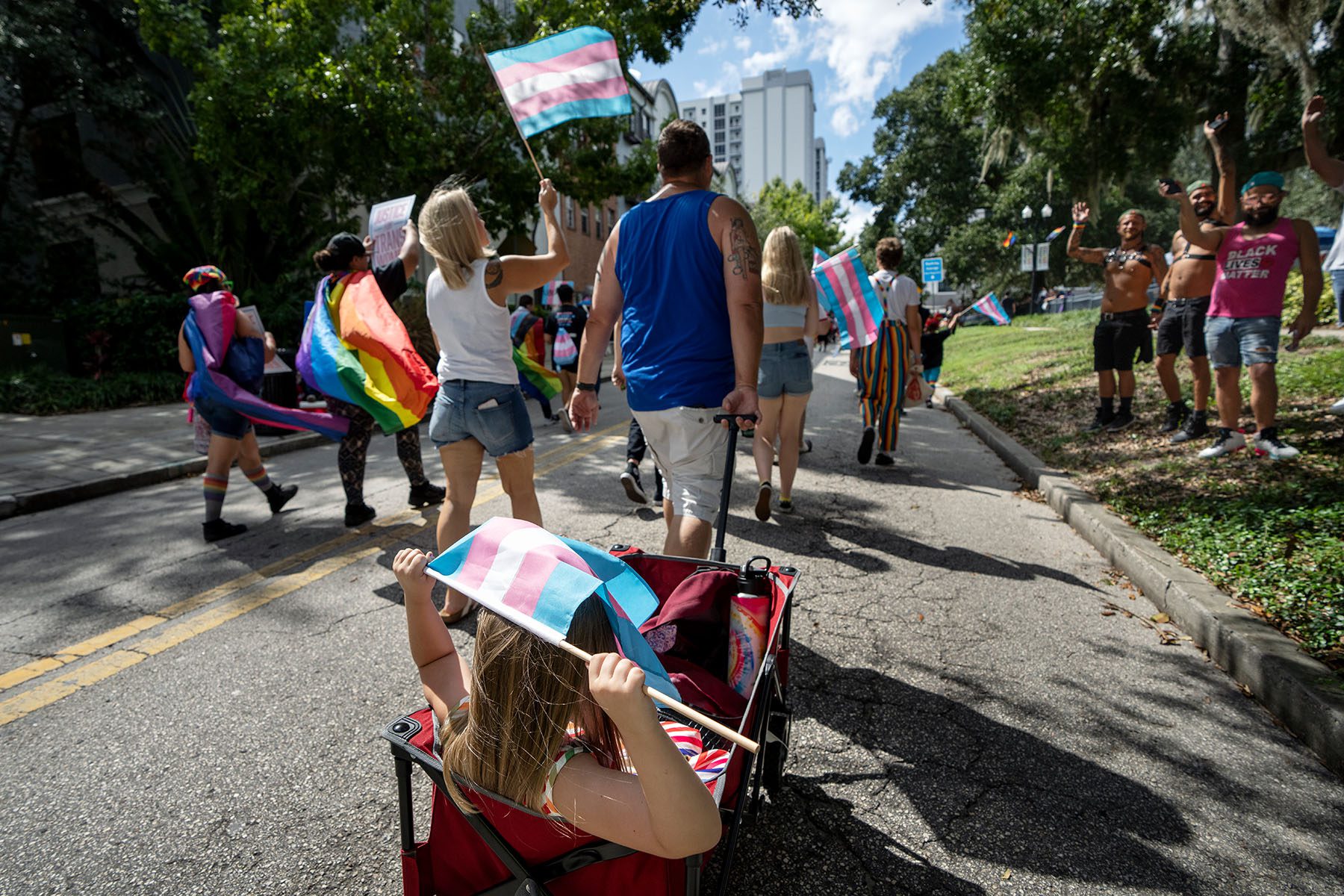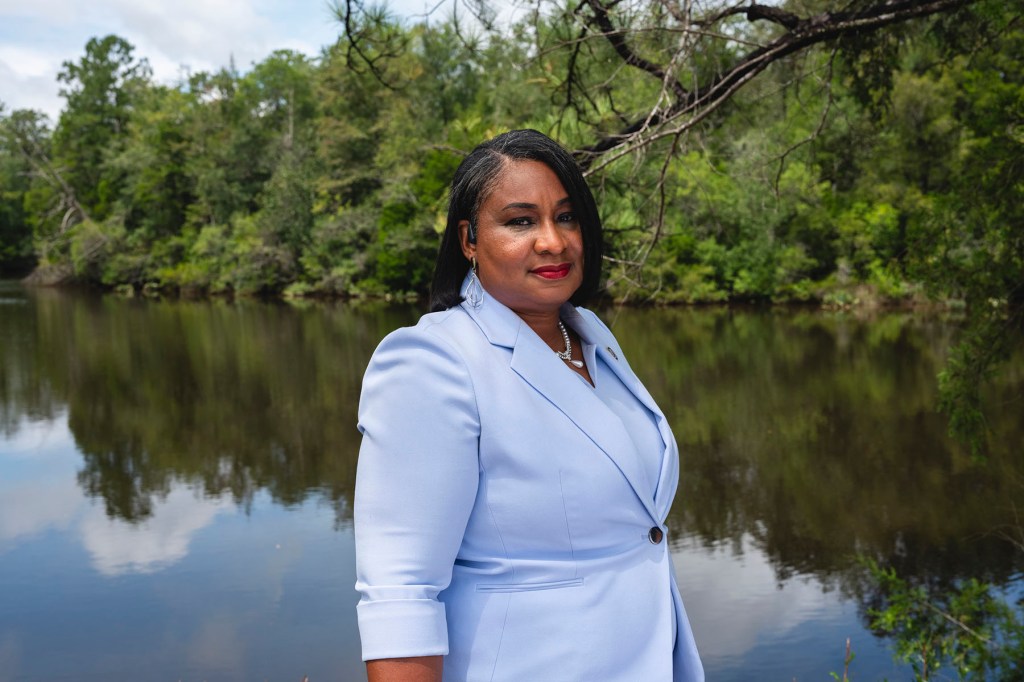Florida has restricted gender-affirming care for trans youth after a vote from the state’s medical board on Friday, though it’s unclear when the restrictions will go into effect. The restrictions do not include current trans youth receiving gender-affirming care and include a carve-out for new patients that would apply to doctors licensed by the state’s board for osteopathic medicine.
The ban prevents minors from beginning puberty blockers and hormone treatments if they had not already started receiving the care prior to the rule’s effective date. Rin AJ, a public policy associate with Equality Florida who attended Friday’s meeting, said that though the board voted on Friday to move the process forward, the rule has to be published first before the 21-day public comment period begins, and it’s unclear when the ultimate effective date will be. Rin asked to not disclose her full last name for privacy reasons.
The originally proposed rule allowed trans youth to begin receiving hormones and puberty blockers if they are performed through clinical trials at Florida medical schools such as the University of Florida or University of Miami, and if the trial includes long-term health assessments. The board of medicine voted to scrap this proposal on Friday, while the state’s board of osteopathic medicine voted to keep it — making the practical applications of such trials unclear and sowing confusion among some board members.
Friday’s vote, which the board stressed throughout the process was not political in nature, came in response to pressure from the state’s governor and state health department to ban gender-affirming care for trans youth. Florida’s health department had also originally asked the board to implement a 24-hour waiting period for trans adults seeking hormones or surgery which the board denied. David Diamond, chair of the Florida board of medicine, said during the board’s October 28 meeting that he viewed regulating gender-affirming care for adults as an inappropriate overreach.
Brittany Bruggeman, a pediatric endocrinologist who treats trans youth at the University of Florida’s youth gender program, said that as a medical professional affected by the boards’ decision, the process has been difficult.
“It is not what I would expect from a regulatory body that’s supposed to have the safety of patients at its heart,” she said.
The board of medicine spent three meetings over a span of three months discussing gender-affirming care, she said, whereas the most recent guidelines by the World Professional Association of Transgender Health on gender-affirming care took years to develop.
“They’re saying that they think they’re able to interpret this evidence better than every major medical association,” Bruggeman said. The American Medical Association (AMA) and the American Academy of Pediatrics, among other medical groups, oppose restrictions on gender-affirming care that would affect trans adults and youth.
Diamond on Friday said that after hearing from experts in the field, the board of medicine understood that restricting ongoing gender-affirming care for trans youth could have unexpected health consequences and that the rule does not terminate ongoing care.
Jacob Wiley, a 17-year-old transgender teenager living with his parents in Gainesville, attended the board of medicine’s meeting to discuss the new rule on October 28 but didn’t get the chance to speak.
Wiley was prescribed puberty blockers from the University of Florida’s youth gender clinic when he was 15, after coming out to his parents the previous year. He took puberty blockers for a few months before starting testosterone shortly afterwards in February 2020. Starting hormones was less a rush of euphoria, and more like a normalization of his life — finally having other people see him for who he always was.
“I don’t really know how to explain the feeling. It felt right, because my entire life I was forced to live not as a boy,” Wiley said.
One point that Wiley wanted to highlight for the board, which he was not able to do during a public comment period that was ended early, was to tell them that he was suicidal before he was able to start transitioning through hormone therapy. Wiley said he started crying at one point during the board’s meeting last month, which he attended with his dad, thinking of how it would affect him if he needed to start hormone therapy now. He believes the board’s decision will do a lot of mental health damage to other trans teens in the state.
“It’s telling trans kids that you’re gonna have to wait to like to feel valid, to feel normal, and it’s telling us that we have to be seen as freaks until we’re 18,” Wiley said.
Harrison Lundy, a 20-year old nonbinary and trans person who attended the board’s October 28 meeting as well as Friday’s meeting, also was not able to share their perspective with the board. Lundy, who lives in southern Hillsborough County, does not want to undergo hormones or surgeries as part of his gender transition, but he’s still worried about how the rule could harm trans people in Florida.
Lundy is worried that banning care for trans youth in the state will lead to increased discrimination against trans people overall. Navigating their own gender identity while watching the state propose and implement different policies affecting their community — banning classroom instruction on sexual orientation or gender identity, banning gender-affirming care through Medicaid, and now restricting care for trans youth — has been its own struggle.
Finding community with other trans people through activism helps, and so does reflecting that their gender identity is what they say it is.
“I could easily move up to somewhere like New York, but it’s not going to stop the problems that are going on here,” they said.
Bruggeman sees roughly 30 patients a month in the University of Florida’s youth gender clinic. She said that since the board of medicine’s October meeting, numerous patients have expressed their distress and that a few families have initiated the process of moving.
One thing that keeps Bruggeman up at night is the risk of her patients, or any trans youth in Florida, experiencing suicidal ideation due to not being able to access gender-affirming care — or simply due to being in the middle of a debate like this one.
“They’re basically showing our patients that who they are doesn’t matter to the state, or even the state is against who they are as a person,” she said. She worries about the psychological effect that that message could have for trans youth in Florida.






